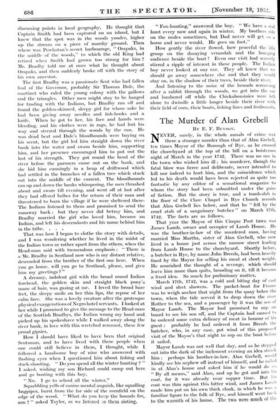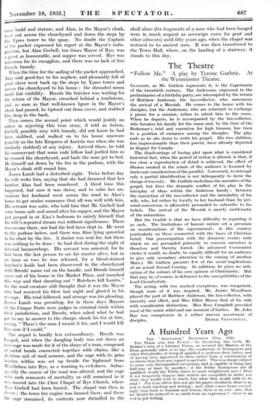The Murder of Alan Grebell By E. F. BENSON. N EVER,
surely, in the whole annals of crime was there a stranger murder than that of Alan Grebell, ten times Mayor of the Borough of Rye, as he crossed the churchyard at the top of the Mil on a boisterous night of March in the year 1742. There was no one in the town who wished him ill ; his murderer, though the fatal blow was fierce and deliberate, never intended to kill nor indeed to hurt him, and the coincidence which led to his death would have been rejected as quite too fantastic by any editor of a sensational magazine to whom the story had been submitted under the guise of fiction. But the story is true, and a tomb-slab in the floor- of the Clare Chapel in Rye Church records that Alan Grebell lies below, and that he- " fell by the cruel stab of a sanguinary butcher" on March 17th, 1742. The facts are as follows.
That year the Mayor of this Cinque Port town was James Lamb, owner and occupier of Lamb House. He was the brother-in-law of the murdered man, having married Miss Martha, sister of Alan Grebell, who now lived in a house just across the narrow street leading from Lamb House to the churchyard. Shortly before, a butcher in Rye, by name John Breeds, had been heavily fined by the Mayor for selling his meat at short weight. He nourished the thought of a revenge, which should leave him more than quits, brooding on it, till it became a fixed idea. So much for preliminary matter.
March 17th, 1742, was a cold and biting day of cast wind and sleet showers. The packet-boat for France was to weigh anchor that night from the quay below the town, :when the tide served it to drop down the river Rother to the sea, and a passenger by it was the son of Mayor Lamb. The Mayor had promised to sup on board to see his son off, and the -Captain had caused to be ordered some extra delicacy of meat in honour of his guest : probably he had ordered it from Breeds the butcher, who, in any case, got wind of this proposed visit of the Mayor's that night to sup on the boat before it sailed. - Mayor Lamb was not well that day, and as he stepped out into the dark of the inclement evening un idea struck him : perhaps his brother-in-law, Alan Grebell, would kindly see his nephew off instead of himself, and he called in at Alan's house and asked him if he would do so. "By all means," said Alan, and up he got and into his coat, for it was already near supper time. But lus coat was thin against this bitter wind, and James Lamb made him put on his own thick cloak, in which he was a. familiar figure to the folk of Rye, and himself went Nu k to the warifith of his house. The two were much of tlit: same build and stature, and Alan, in the Mayor's cloak, went out across the churchyard and down- the steps by the Ypres tower to the quay. No doubt the Captain of the packet expressed his regret at the Mayor's indis- position, but Alan Grebell, ten times Mayor of Rye, was a guest as honourable, and supper was served. Rye was notorious for its smugglers, and there was no lack of fine French brandy.
When the time for the sailing of the packet approached, Alan said good-bye to his nephew, and pleasantly full of good cheer went back up the steps by Ypres tower and across the churchyard to" his house : the shrouded moon made fair visibility. Breeds the butcher was waiting for the return of the Mayor, crouched behind a tombstone, and, as soon as that well-known figure in the Mayor's cloak had passed, he tiptoed out from cover, and stabbed him deep in the back.
Then comes the second point which would justify an editor in rejecting : this true story, if told as fiction. Grebell, possibly rosy with brandy, did not know he had been stabbed, and walked on to his house unaware (exactly as the late Empress of Austria was when she was similarly stabbed) of any injury. Arrived there, he told his manservant that some rude fellow had jostled him as he crossed the churchyard, and bade the man get to bed. He himself sat down by the fire in the parlour, with the .Mayor's cloak still round him.
James Lamb had a disturbed night. Twice before day his wife woke him, saying that she had dreamed that her brother Alan had been murdered. A third time this happened, but now it was dawn, and to_ calm her un- easiness her husband went across the road to Alan's house to get ocular assurance that all was well with him. His servant was astir, who told him that Mr. Grebell had come home safe and sound after his supper, and the Mayor just peeped in at Alan's bedroom to satisfy himself that his wife's repeated dream was without significance. There was no one there, nor had the bed been slept in. He went to the parlour below, and there- was Alan lying sprawled in his chair by the fire. A doctor was sent for, but there was nothing to be done : he had died during the night of internal haemorrhage. His servant was arrested, for he had been the last person to see his master alive, but in an hour or two he was released, for a blood-stained butcher's knife had been discovered in the churchyard with Breeds' name cut on the handle, and Breeds himself came out of his house in the Market Place, and marched this way-and that shouting out" Butchers kill Lambs," for the mad creature still thought that it was the Mayor who had received his blow last night and gloried in his revenge. His trial followed, and strange was his pleading. James Lamb was presiding, for in those days Mayors of the Cinque Ports were judges in criminal trials within their jurisdiction, and Breeds, when asked what he had got to say in answer to the charge, shook his fist at him, crying, "There's the man I meant it for, and I would kill him now if I -could."
The sequel is hardly less extraordinary. . Breeds was hanged, and when the dangling body was cut down an iron cage was made for it of the shape of a man, composed of metal bands connected together with . chains, like a skeleton suit of mail armour, and the cage with its grim burden, within was set up beside the highroad from 1VinehelSea into Rye, as a warning to evil-doers. Subse- quently the course of the road was altered, and the cage With such remnants of mortality. as still remained in it was moved-into the Clare Chapel of Rye Church, where Alan Grebell had been buried. The chapel was then in disuse: the town fire engine was housed there, and there the cage remained,, its contents now dwindled to the skull alone (for fragments of a man who had been hanged were in much request as sovereign cures for gout and other ailments) until fifty years ago, when the chapel was restored to its ancient uses. It was then transferred to the. Town Hall, where, on the landing of a stairway, it stands to this day.

































































 Previous page
Previous page